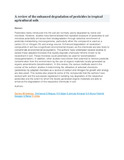A review of the enhanced degradation of pesticides in tropical agricultural soils

Date
2023-05-09Author
Getenga, Zachary M
Mogusu, Emmanuel O
Ngige, A N
Kimosop, S Jemutai
Mutua, G K
Kengara, Fredrick
Reiner, S
Ulrike, D
Metadata
Show full item recordAbstract
Pesticides newly introduced into the soil are normally poorly degraded by native soil microbes. However, studies have demonstrated that repeated exposure of pesticides to soil microbes potentially enhances their biodegradation through selective enrichment of pesticide-metabolising microorganisms, particularly when the compound is used as a carbon (C) or nitrogen (N) and energy source. Enhanced degradation of recalcitrant compounds in soil has a significant environmental impact, as the chemicals are less likely to contaminate environmental ecosystems. The authors have undertaken several studies to isolate these adapted microbes that rapidly degrade chemicals hitherto known to be recalcitrant in soil. These microbes could potentially be used for bioremediation (bioaugmentation). In addition, other studies have shown their potential to remove pesticide contamination from the environment by the use of organic materials locally generated as organic amendments (biostimulation). In this review, the various methods used in the course of the authors’ studies in determining the utilisation of selected chemicals (pesticides) by adapted microbes as a source of carbon and nitrogen for growth and energy are discussed. This review also presents some of the compounds that the authors have worked with and the successes registered in isolating key degraders of the respective pesticides and the extent to which the locally generated organic materials are able to enhance the degradation of the respective chemicals in soil.
URI
https://doi.org/10.1680/jenes.22.00096https://www.icevirtuallibrary.com/doi/10.1680/jenes.22.00096
http://ir-library.mmust.ac.ke:8080/xmlui/handle/123456789/2200
Collections
- Gold Collection [1026]
